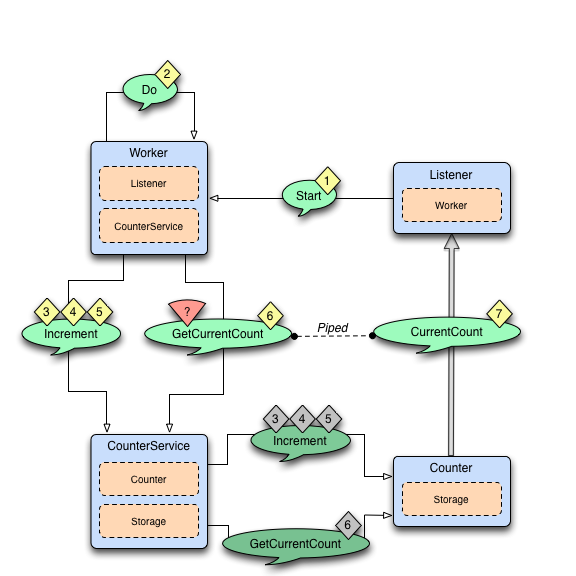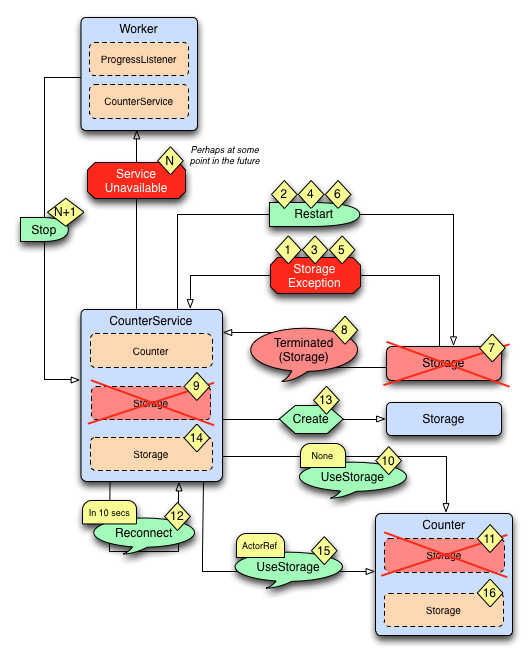Diagrams of the Fault Tolerance Sample

The above diagram illustrates the normal message flow.
Normal flow:
| Step | Description |
|---|---|
| 1 | The progress Listener starts the work. |
| 2 | The Worker schedules work by sending Do messages periodically to itself |
| 3, 4, 5 | When receiving Do the Worker tells the CounterService
to increment the counter, three times. The Increment message is forwarded
to the Counter, which updates its counter variable and sends current value
to the Storage. |
| 6, 7 | The Worker asks the CounterService of current value of the counter and pipes
the result back to the Listener. |

The above diagram illustrates what happens in case of storage failure.
Failure flow:
| Step | Description |
|---|---|
| 1 | The Storage throws StorageException. |
| 2 | The CounterService is supervisor of the Storage and restarts the
Storage when StorageException is thrown. |
| 3, 4, 5, 6 | The Storage continues to fail and is restarted. |
| 7 | After 3 failures and restarts within 5 seconds the Storage is stopped by its
supervisor, i.e. the CounterService. |
| 8 | The CounterService is also watching the Storage for termination and
receives the Terminated message when the Storage has been stopped ... |
| 9, 10, 11 | and tells the Counter that there is no Storage. |
| 12 | The CounterService schedules a Reconnect message to itself. |
| 13, 14 | When it receives the Reconnect message it creates a new Storage ... |
| 15, 16 | and tells the Counter to use the new Storage |
Full Source Code of the Fault Tolerance Sample
import akka.actor._
import akka.actor.SupervisorStrategy._
import scala.concurrent.duration._
import akka.util.Timeout
import akka.event.LoggingReceive
import akka.pattern.{ ask, pipe }
import com.typesafe.config.ConfigFactory
/**
* Runs the sample
*/
object FaultHandlingDocSample extends App {
import Worker._
val config = ConfigFactory.parseString("""
akka.loglevel = "DEBUG"
akka.actor.debug {
receive = on
lifecycle = on
}
""")
val system = ActorSystem("FaultToleranceSample", config)
val worker = system.actorOf(Props[Worker], name = "worker")
val listener = system.actorOf(Props[Listener], name = "listener")
// start the work and listen on progress
// note that the listener is used as sender of the tell,
// i.e. it will receive replies from the worker
worker.tell(Start, sender = listener)
}
/**
* Listens on progress from the worker and shuts down the system when enough
* work has been done.
*/
class Listener extends Actor with ActorLogging {
import Worker._
// If we don't get any progress within 15 seconds then the service is unavailable
context.setReceiveTimeout(15 seconds)
def receive = {
case Progress(percent) =>
log.info("Current progress: {} %", percent)
if (percent >= 100.0) {
log.info("That's all, shutting down")
context.system.terminate()
}
case ReceiveTimeout =>
// No progress within 15 seconds, ServiceUnavailable
log.error("Shutting down due to unavailable service")
context.system.terminate()
}
}
object Worker {
case object Start
case object Do
final case class Progress(percent: Double)
}
/**
* Worker performs some work when it receives the `Start` message.
* It will continuously notify the sender of the `Start` message
* of current ``Progress``. The `Worker` supervise the `CounterService`.
*/
class Worker extends Actor with ActorLogging {
import Worker._
import CounterService._
implicit val askTimeout = Timeout(5 seconds)
// Stop the CounterService child if it throws ServiceUnavailable
override val supervisorStrategy = OneForOneStrategy() {
case _: CounterService.ServiceUnavailable => Stop
}
// The sender of the initial Start message will continuously be notified
// about progress
var progressListener: Option[ActorRef] = None
val counterService = context.actorOf(Props[CounterService], name = "counter")
val totalCount = 51
import context.dispatcher // Use this Actors' Dispatcher as ExecutionContext
def receive = LoggingReceive {
case Start if progressListener.isEmpty =>
progressListener = Some(sender())
context.system.scheduler.schedule(Duration.Zero, 1 second, self, Do)
case Do =>
counterService ! Increment(1)
counterService ! Increment(1)
counterService ! Increment(1)
// Send current progress to the initial sender
counterService ? GetCurrentCount map {
case CurrentCount(_, count) => Progress(100.0 * count / totalCount)
} pipeTo progressListener.get
}
}
object CounterService {
final case class Increment(n: Int)
sealed abstract class GetCurrentCount
case object GetCurrentCount extends GetCurrentCount
final case class CurrentCount(key: String, count: Long)
class ServiceUnavailable(msg: String) extends RuntimeException(msg)
private case object Reconnect
}
/**
* Adds the value received in `Increment` message to a persistent
* counter. Replies with `CurrentCount` when it is asked for `CurrentCount`.
* `CounterService` supervise `Storage` and `Counter`.
*/
class CounterService extends Actor {
import CounterService._
import Counter._
import Storage._
// Restart the storage child when StorageException is thrown.
// After 3 restarts within 5 seconds it will be stopped.
override val supervisorStrategy = OneForOneStrategy(
maxNrOfRetries = 3,
withinTimeRange = 5 seconds) {
case _: Storage.StorageException => Restart
}
val key = self.path.name
var storage: Option[ActorRef] = None
var counter: Option[ActorRef] = None
var backlog = IndexedSeq.empty[(ActorRef, Any)]
val MaxBacklog = 10000
import context.dispatcher // Use this Actors' Dispatcher as ExecutionContext
override def preStart() {
initStorage()
}
/**
* The child storage is restarted in case of failure, but after 3 restarts,
* and still failing it will be stopped. Better to back-off than continuously
* failing. When it has been stopped we will schedule a Reconnect after a delay.
* Watch the child so we receive Terminated message when it has been terminated.
*/
def initStorage() {
storage = Some(context.watch(context.actorOf(Props[Storage], name = "storage")))
// Tell the counter, if any, to use the new storage
counter foreach { _ ! UseStorage(storage) }
// We need the initial value to be able to operate
storage.get ! Get(key)
}
def receive = LoggingReceive {
case Entry(k, v) if k == key && counter == None =>
// Reply from Storage of the initial value, now we can create the Counter
val c = context.actorOf(Props(classOf[Counter], key, v))
counter = Some(c)
// Tell the counter to use current storage
c ! UseStorage(storage)
// and send the buffered backlog to the counter
for ((replyTo, msg) <- backlog) c.tell(msg, sender = replyTo)
backlog = IndexedSeq.empty
case msg: Increment => forwardOrPlaceInBacklog(msg)
case msg: GetCurrentCount => forwardOrPlaceInBacklog(msg)
case Terminated(actorRef) if Some(actorRef) == storage =>
// After 3 restarts the storage child is stopped.
// We receive Terminated because we watch the child, see initStorage.
storage = None
// Tell the counter that there is no storage for the moment
counter foreach { _ ! UseStorage(None) }
// Try to re-establish storage after while
context.system.scheduler.scheduleOnce(10 seconds, self, Reconnect)
case Reconnect =>
// Re-establish storage after the scheduled delay
initStorage()
}
def forwardOrPlaceInBacklog(msg: Any) {
// We need the initial value from storage before we can start delegate to
// the counter. Before that we place the messages in a backlog, to be sent
// to the counter when it is initialized.
counter match {
case Some(c) => c forward msg
case None =>
if (backlog.size >= MaxBacklog)
throw new ServiceUnavailable(
"CounterService not available, lack of initial value")
backlog :+= (sender() -> msg)
}
}
}
object Counter {
final case class UseStorage(storage: Option[ActorRef])
}
/**
* The in memory count variable that will send current
* value to the `Storage`, if there is any storage
* available at the moment.
*/
class Counter(key: String, initialValue: Long) extends Actor {
import Counter._
import CounterService._
import Storage._
var count = initialValue
var storage: Option[ActorRef] = None
def receive = LoggingReceive {
case UseStorage(s) =>
storage = s
storeCount()
case Increment(n) =>
count += n
storeCount()
case GetCurrentCount =>
sender() ! CurrentCount(key, count)
}
def storeCount() {
// Delegate dangerous work, to protect our valuable state.
// We can continue without storage.
storage foreach { _ ! Store(Entry(key, count)) }
}
}
object Storage {
final case class Store(entry: Entry)
final case class Get(key: String)
final case class Entry(key: String, value: Long)
class StorageException(msg: String) extends RuntimeException(msg)
}
/**
* Saves key/value pairs to persistent storage when receiving `Store` message.
* Replies with current value when receiving `Get` message.
* Will throw StorageException if the underlying data store is out of order.
*/
class Storage extends Actor {
import Storage._
val db = DummyDB
def receive = LoggingReceive {
case Store(Entry(key, count)) => db.save(key, count)
case Get(key) => sender() ! Entry(key, db.load(key).getOrElse(0L))
}
}
object DummyDB {
import Storage.StorageException
private var db = Map[String, Long]()
@throws(classOf[StorageException])
def save(key: String, value: Long): Unit = synchronized {
if (11 <= value && value <= 14)
throw new StorageException("Simulated store failure " + value)
db += (key -> value)
}
@throws(classOf[StorageException])
def load(key: String): Option[Long] = synchronized {
db.get(key)
}
}
Contents